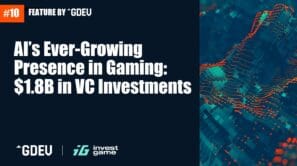Features
Show entries

- Capital Reset: $19.2B across 362 Swedish gaming transactions (2014–2025); public-market-driven consolidation accelerated during the zero-interest-rate period (2020–2022) and shifted in 2023–2025 toward balance-sheet repair, restructurings, and asset divestments as macro conditions tightened.
- Public Markets Model: Nasdaq First North functioned as a growth-capital venue, enabling early listings for companies such as Embracer, Paradox, Stillfront, and EG7, and supporting roll-up strategies until rising rates and valuation compression undermined the multiple-arbitrage model.
- Creative Output: Sweden accounted for ~20% of Steam’s 2025 gross revenue and continued shipping global PC, console, and mobile hits during 2023–2025, even as public gaming groups underwent restructurings and balance-sheet repair.
- Capital Realignment: $20.7B in transactions across 208 gamified consumer-app investments and exits since 2020—as mobile gaming IAPs stagnate, non-gaming consumer apps surged +24% YoY to $41B, proving gamification now drives mainstream consumer growth.
- Vertical Dynamics: EdTech ($4.4B raised), Fitness & Wellness ($2.4B), and Entertainment & Social ($2.5B exits) show distinct paths—from Duolingo’s +160% IPO to Headspace–Ginger’s $3B merger and Reddit’s public debut.
- Strategic Validation: Google–Fitbit $2.1B deal, Naver–Wattpad $600M transaction, and Goldman’s $1.7B Kahoot! take-private confirm gamified retention loops have become essential infrastructure for consumer engagement.
- Mobile Dominance vs AAA Legacy: Why have ex-Peak Games veterans turned Istanbul into a $6B mobile powerhouse (Royal Match, Spyke, Ace Games), while ex-Rockstar and 2K alumni struggle to replicate AAA success — what makes mobile alumni more VC-friendly?
- Capital Concentration: With $671m of the $1.2B raised flowing into mobile alumni vs just $325m into PC & Console, is investor confidence purely about faster ROI and unit economics — or are AAA alumni facing a structural fundraising disadvantage?
- The Alumni Paradox: Take-Two’s brand equity rests on global AAA IPs, yet its alumni’s biggest wins come from puzzle-based mobile games. What does this say about the future of talent migration and investor priorities?
- Capital Concentration Paradox: Why did $6.7B of the ~$9B UGC investments since 2020 flow almost entirely into Roblox and Epic — what makes late-stage investors double down on incumbents while challengers struggle for retention and monetization?
- Ecosystem-Native Studios: How are teams building inside Roblox and Fortnite scaling into publisher-level businesses — what content strategies, live-ops, and M&A dynamics prove ecosystem hits can rival standalone launches?
- Beyond the Duopoly: With Rec Room layoffs, Zepeto’s social commerce bet, and blockchain-driven experiments, can niche challengers crack network effects and sustainable economics — or will UGC remain dominated by two platforms?
- Market Paradox: Why does mobile gaming attract record M&A while VC investment shrinks — what drives buyers to double down as VCs retreat?
- Operational Edge: How have studios evolved into predictable, scalable revenue machines — what live ops, monetization, and UA strategies set them apart?
- Genre & Geography Shifts: How did the collapse of hypercasual and rise of casual, hybrid models, and regions like Turkey reshape the mobile gaming landscape?
- Investment Evolution: How did private equity transition from cautious observer to a $21B+ kingmaker in gaming M&A—what catalyzed this shift?
- Strategic Playbooks: What frameworks define today’s PE-led transactions—and how do growth investments, add-ons, and exits shape the industry?
- Platform Building: Why are PE firms pivoting to roll-up strategies and platform creation across content, infrastructure, and services?
- Funding Trends: Why is AI in gaming still dominated by early-stage investment, and what early signs point to a possible shift?
- Segment Dynamics: Which AI use cases are attracting the most capital—and why is content generation leading the charge?
- Strategic Shift: How is AI reshaping the gaming infrastructure landscape, and what does this mean for future M&A?
- These and other critical questions will be explored through the cases of Stability AI, Parametrix AI, Gcore, Leonardo AI, and others redefining gaming infrastructure through AI innovation.
Subscribe for our weekly newsletter
Get the weekly digest on all the latest gaming transactions, with the number and size of the deals, as well as the strategic rationale behind them.













